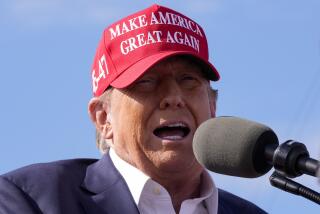New Trust Takes Shape to Aid Clinton
- Share via
WASHINGTON — With President Clinton’s legal expenses plunging him ever deeper in debt, the White House counsel’s office is on the verge of officially approving guidelines for a new trust that will be able to solicit large contributions for his defense.
An earlier trust, which was permitted to accept funds but not solicit them, was dissolved at the end of last year after contributions fell off sharply and it became embroiled in the campaign fund-raising investigations.
White House Counsel Charles F.C. Ruff, after wrestling for a month with ethical and legal issues involved in setting up the new trust, said that his office is working “as quickly as we can” and that he expects to “resolve all the issues within a week or so.” He expects the Office of Government Ethics to quickly give the guidelines a final stamp of approval.
Although details of the guidelines governing the trust have not been released, they are likely to be much looser than those that restricted the first fund and limited its individual contributions to $1,000. Sources familiar with the fund-raising efforts say the new trust probably will set the maximum contribution at $10,000, the limit used by the Senate in its rules governing defense funds for senators.
The guidelines, the sources said, also will probably permit direct mailing and fund-raising events, which some supporters think will be necessary if Clinton is to pay off his rapidly mounting debt, now approaching $4 million.
The new trust will replace the Presidential Legal Expense Trust, which was set up in 1994 and was dissolved at the end of 1997. Clinton asked the counsel’s office for advice on setting up another trust to address legal fees already accumulated “and those that will be generated by the need for ongoing representation.”
Michael Cardozo, executive director of the original trust, said he expects the new one, which will operate independent of the Clintons, to be more successful than the first because “there is a core of Clinton supporters out there who have not contributed, but will contribute if they are asked by the right person.” And their contributions will be needed, he said, because “a lot of lawyers’ meters are running.”
With the president’s popularity at an all-time high and his legal bills destined to continue piling up for months or longer, Clinton supporters believe it is important for the fund-raising effort to be launched quickly.
Several high-paid attorneys representing the president in the Paula Corbin Jones sexual-harassment case and the various investigations by Whitewater independent counsel Kenneth W. Starr have been buttressed by two other lawyers--former Commerce Secretary Mickey Kantor and former Deputy White House Chief of Staff Harold M. Ickes--in the latest Clinton crisis involving ex-White House intern Monica S. Lewinsky.
The bipartisan board of trustees that oversaw the original trust could not solicit funds because Clinton and his wife, Hillary Rodham Clinton, established it, and the Office of Government Ethics ruled that neither the president nor his agents (the trustees) could solicit funds for his expenses.
The eight-member board of the first trust, chaired by former Atty. Gen. Nicholas deB. Katzenbach and former Notre Dame University President Theodore Hesburgh, attributed the drop-off in contributions largely to a negative political climate caused by numerous, highly publicized investigations of campaign fund-raising. The trustees concluded that, because they could not actively solicit funds, the trust had become ineffective.
Although the original trust raised more than $1.3 million and paid more than $766,000 in Clinton’s legal expenses, it turned out to be more trouble than some Democrats thought was worth.
Trustees had to refund more than $600,000 collected by Yah Lin “Charlie” Trie after they became concerned about whether some of the $1,000 donations he had collected from members of a Buddhist sect had been coerced. Trie, who was indicted last week by a federal grand jury in connection with his Democratic fund-raising activities, surrendered to U.S. authorities Tuesday.
Congressional committees and the Justice Department investigated the trust fund last year, at a cost to the fund of nearly $90,000 in legal expenses. And Cardozo, who had to testify before a congressional committee, said the notoriety associated with the investigation had a chilling effect on contributions. In the first 11 months of 1997, the trust raised $80,000 and paid $92,000 in legal and administrative costs.
As of Nov. 30, Clinton faced about $3 million in legal bills, Cardozo said.
More to Read
Sign up for Essential California
The most important California stories and recommendations in your inbox every morning.
You may occasionally receive promotional content from the Los Angeles Times.












